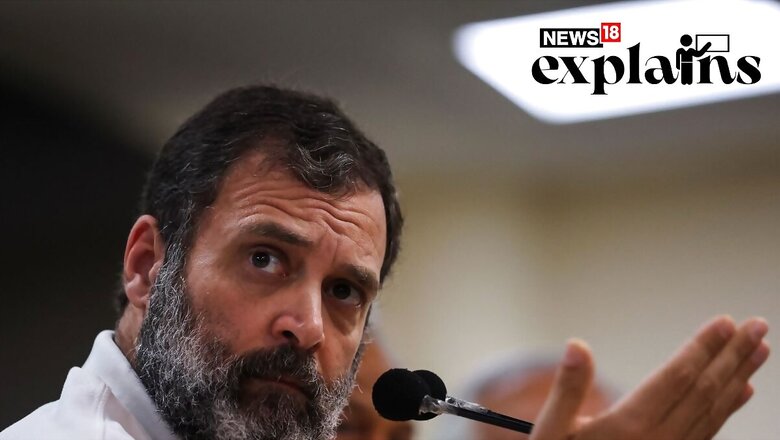
views
In a significant setback for Rahul Gandhi, the Gujarat High Court has upheld the order of the Sessions Court denying a stay on his conviction in the Modi surname defamation case. This means that Rahul Gandhi will not be able to participate in electoral contests or seek the revocation of his status as a Member of Parliament. His only recourse now is to approach the Supreme Court to challenge this decision. As the situation unfolds, all eyes will be on Rahul Gandhi’s next move and the subsequent proceedings in the Supreme Court. The outcome of his appeal will have significant implications not only for his personal political career but also for the upcoming Lok Sabha elections. Read more
A timeline of the case:
- On March 23, 2023, Rahul Gandhi was convicted in the Modi surname case by a Surat district court and was sentenced to a two-year jail term.
- On March 24, due to his conviction, Rahul Gandhi was disqualified from the Lok Sabha as it is not permissible for a convicted person to remain a parliamentarian.
- Seeking a stay on his conviction, Rahul Gandhi approached the Surat sessions court, but on April 20, his plea was dismissed. The court emphasized that as an MP and former leader of the country’s second-largest political party, Rahul Gandhi should have exercised greater caution.
- On April 25, Rahul Gandhi filed an appeal challenging the Surat sessions court’s decision in the high court.
- In May, the Gujarat High Court declined to grant interim relief to Rahul Gandhi and stated that the final order would be issued after the summer break.
- Following Rahul Gandhi’s conviction in the Purnesh Modi case in Surat, additional defamation cases were filed against him, including one by Rajya Sabha MP Sushil Kumar Modi. On July 4, the Patna High Court stayed the proceedings of the criminal defamation case until January 12, 2023.
- On July 4, the Jharkhand High Court addressed another defamation case filed by advocate Pradeep Modi and ordered that no coercive action be taken against Rahul Gandhi until the next hearing scheduled for August 16.
What is the Modi Surname Case?
The case involves a defamation lawsuit filed by Purnesh Modi, a BJP MLA and former Gujarat minister, against Rahul Gandhi, the former Congress party chief. The defamation case was filed under sections 499, 500, and 504 of the Indian Penal Code (IPC) based on a comment made by Rahul Gandhi during a campaign rally in Kolar, Karnataka, during the 2019 Lok Sabha general elections.
Rahul Gandhi’s statement during the rally on April 13, 2019, was, “Why all the thieves, be it Nirav Modi, Lalit Modi, or Narendra Modi, have Modi in their names.” The complainant, Purnesh Modi, alleged that Rahul Gandhi’s comment defamed all individuals with the surname Modi, which amounts to a significant number of people in India, approximately 130 million according to rough estimates.
On October 10, 2019, Rahul Gandhi appeared before the court and pleaded not guilty to the charges. In March 2022, the Gujarat High Court granted a stay on the proceedings after the complainant requested it, citing insufficient evidence. However, in February of the following year, the stay was lifted after Purnesh Modi informed the High Court that there was sufficient evidence, including CDs and pen drives, which had been presented during the trial.
During the course of the case, Rahul Gandhi’s lawyer, Babu Mangukiya, argued that Prime Minister Narendra Modi should have been the complainant instead of Purnesh Modi since Rahul Gandhi’s speech primarily targeted the Prime Minister.
What are SECTIONS 499 AND 500 OF IPC?
Gandhi was sentenced under sections 499 and 500 of the Indian Penal Code (IPC), which deal with criminal defamation. Section 499 defines what is defamation while section 500 of the Indian Penal Code (IPC) lays down the punishment for people convicted of criminally defaming a person.
Section 499 states that any words spoken, read, or gestured with the intention of harming a person’s reputation is to be considered defamation and attract legal punishments.
It also cites exceptions. These include “imputation of truth” which is required for the “public good” and thus has to be published, on the public conduct of government officials, the conduct of any person touching any public question and merits of the public performance. Section 500 states that a person found guilty of this crime “shall be punished with simple imprisonment for a term which may extend to two years, or with fine, or with both.”



















Comments
0 comment